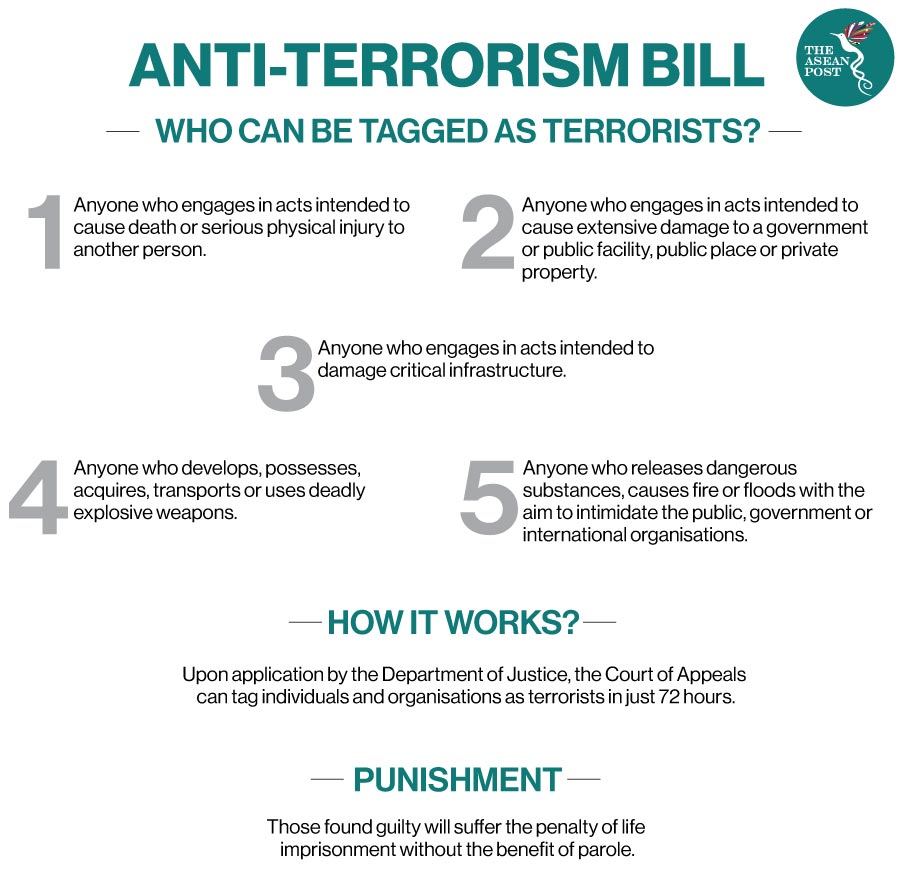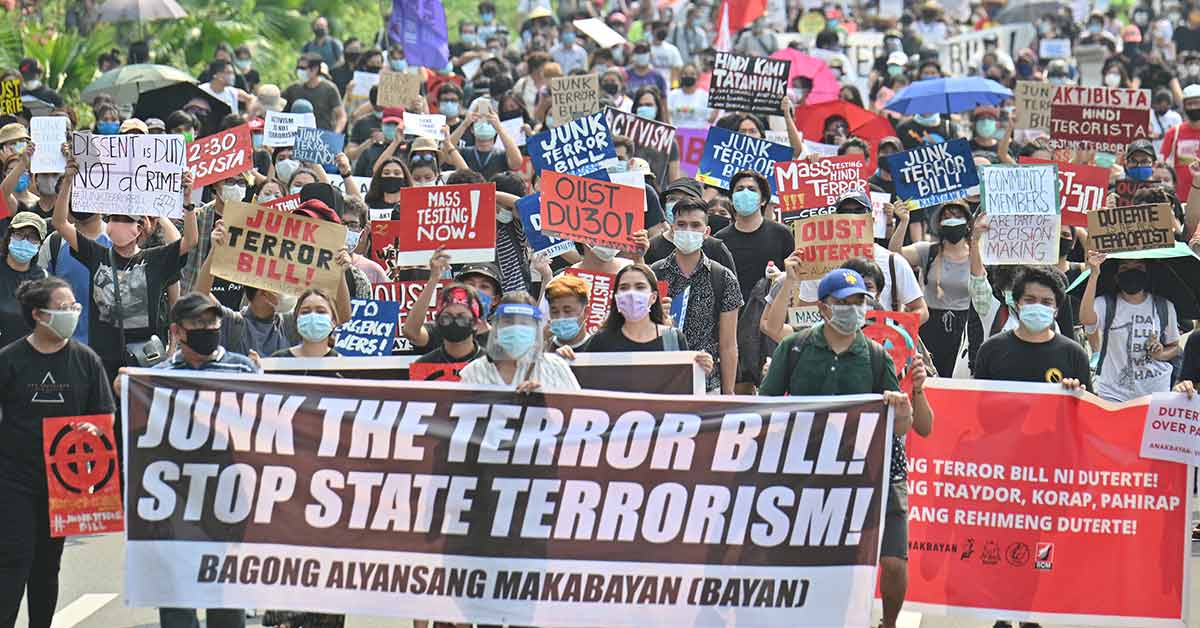It has been three years now since the tragic “Marawi Siege”, but until now, terrorist attacks continue to permeate the Philippines making it hard for the government to secure its citizens from those who persistently seek to attack the lives and the way of life of every Filipino. The Marawi Siege just like the tragic events of 11 September (9/11), the Bali bombings, and the home-grown terrorists’ attacks in London, is the quintessence of the country’s long struggle against terrorism. Even while facing a deadly pandemic, the internal and external threats of terrorism are continuously making a dent in the country’s peace and security; compounding the already difficult situation brought about by the novel coronavirus.
Hence, it cannot be denied that the Philippines, more predominantly the southern part of the country where the Maute Group also known as the Islamic State of Lanao, and the Abu Sayyaf Group (ASG) then linked with international terror organisation, Al-Qaeda and now with the Islamic State are situated, has long been a haven of terrorist activities. There’re also the intimidations posed by pro-IS Bangsamoro Freedom Fighters (BIFF), whose leader Sheik Muhiddin Animbang, alias Commander “Kagi Karialan” recently made a plea to his followers to unleash attacks against the government of the Philippines. BIFF forces are mainly situated in the forested and mountainous areas of Maguindanao and Cotabato and are unhappy with the government’s policy of not allowing congregation in mosques because of the COVID-19 pandemic. This according to them is “destroying Islam.”
The country has also faced growing aggression from the New People’s Army (NPA) of the Communist Party of the Philippines, National Democratic Front (CPP-NDF). The CPP-NPA-NDF is listed as a terrorist organisation by the United States (US), European Union (EU), the United Kingdom (UK), Australia, Canada, and New Zealand. The Philippines is also vulnerable to possible external attacks from extremist networks like ISIS and elements of the Southeast Asian terror group, Jemaah Islamiyah.
On 17 April, 2020, 11 soldiers of the Armed Forces of the Philippines (AFP) were killed, while 14 others were wounded during an encounter with suspected ASG members in Brgy Danag, Patikul, Sulu. Likewise, on 27 May, 2020 six thousand residents of Maguindanao had to abandon their homes because of terrorist attacks. And on 5 June, the AFP lost four more soldiers while 17 others were injured in another military encounter with members of the ASG in Sitio Lagaron in Barangay Kan-Ague, Patikul, Sulu.
On 21 March, 2020 in Iligan city, the 44th Infantry Battalion (44th IB) of the AFP was able to thwart an attempted attack by the NPAs to disrupt a government information campaign on COVID-19 in Barangay Penaranda, Kabasalan, Zamboanga Sibugay. Then on 28 March, the NPA launched another attack on government forces in Rizal. Around 30 NPA rebels assaulted a group of 18 Philippine Army Community Support Program Team (PACSPT) soldiers who were in Barangay Puray, Rizal distributing leaflets and relief goods to distraught residents affected by the enhanced community quarantine.
The said clash took the life of one soldier and also one fatality on the part of the NPA. Similarly, on 7 April, 2020, the NPA launched an assault in Pantukan, Davao de Oro, where they attacked the Philippine National Police Mobile Force Company in Barangay Tangdanua. On the same day (7 April), around 30 NPA rebels attacked village officials distributing relief assistance at Sitio Nagon in Barangay Guinmayohan, Balangiga Eastern Samar and forcibly seized some portion of the relief supplies/aid intended for residents of the area affected by the quarantine measures due to the COVID-19 pandemic.
In Calbiga Samar, along a route between Barangays Hubasan and Binanggaran, communist rebels planted landmines as a plot to ambush government forces, which also posed a threat to the lives of the residents of the said areas. Two suspected NPA operatives were intercepted at Barangay Llavac in Real, Quezon, where two anti-personnel mines and four blasting caps were confiscated by the 1st Infantry Battalion. On 22 April, the NPA launched another attack using a bomb on a remote village in Paquibato District, Davao City to disrupt the distribution of a cash emergency subsidy under the Social Amelioration Program (SAP) in the area. Two soldiers were slightly wounded during the fight.

In retrospect, the Philippines is indeed facing serious security challenges on multiple fronts. Muslim extremist groups and the NPA are certainly taking advantage of the COVID-19 outbreak, and are continuously pursuing acts of violence and aggression against government forces and innocent civilians. Now more than ever, it becomes imperative for the government to effectively respond not only to the challenges posed by the COVID-19 virus but also to the threats of terrorism in the country.
The Anti-Terrorism Bill
The Anti-Terrorism Bill, which has been officially transmitted to the Office of the President for signing as confirmed by Presidential Spokesperson Harry Roque on 9 June, 2020, is the improved version of the Human Security Act of 2007. The said bill, just like the Human Security Act of 2007, is very controversial and is confronted by debates between the realists/pragmatists who are cognisant of the need for tougher and compelling counter-terrorism legislation grounded on actual realities, and those who are out of touch and have failed to recognise the enormity and seriousness of numerous terrorist threats confronting the country.
The Anti-Terrorism Bill just like the Human Security Act of 2007 is being opposed by the political opposition and human rights groups who are claiming that the bill contains dangerous provisions that could be abused by authorities once implemented. Others are saying that it has unconstitutional provisions that would undermine the Bill of Rights enshrined in the 1987 Constitution.
However, the principal author of the bill, Senator Panfilo Lacson argued that the “Anti-Terrorism Act of 2020” aims to secure the country and its people from domestic and foreign terrorist attacks. He said that with the help of his colleagues in the Senate, he has made sure that the bill adheres to the Bill of Rights enumerated in the 1987 Constitution. He even articulated that he incorporated most of the provisions of the Anti-Terrorism laws of other strong democracies like Australia and the US, which by far are guided by the standards set by the United Nations (UN).
Despite the explanations and justifications offered by Senator Lacson, those who oppose the bill continue to advocate a popular misconception that the Anti-Terrorism Bill is the anti-thesis of human rights and would likely violate the fundamental rights of Filipinos the moment it is passed into law. This is preposterous. Human rights principles are not rigid and do not constrain the government from effectively countering dangers posed by terrorism. International human rights principles/laws, being the reverberations of the great world wars have long recognised the necessity to strike a balance between national security interests of a particular state and the fundamental rights of its inhabitants.
Practically speaking, this means that on issues such as terrorism, individual rights have to be balanced against the collective security and collective rights of the greater number of people, especially if it’s about securing the collective survival of the greater number of people against aggression and the destruction of human lives caused by terrorism. This further means that human rights laws/principles allow governments to take protective actions proportionate to the severity of the threats. Hence, terrorism being a gross human rights violation requires tougher and stronger counter-terrorism legislation that is proportionate to the objective of safeguarding and preserving the national security and integrity of a particular state/government.
By the same token, the Anti-Terrorism Act of 2020 is a stronger and tougher piece of legislation compared to the Human Security Act of 2007, which according to its principal author Senator Lacson, “aims to protect the Philippines and its citizens from terrorist acts that know no timing nor borders, perpetrated in a manner so sudden, least expected and indiscriminate – as in, anytime, probably even today, tomorrow or next week”, endowed with equally strong check and control mechanisms that protect and safeguards the individual rights of people who might be subjected to it in the advent that it becomes a law.”
Conclusion
Terrorism is a global predicament, and no country is invulnerable to it. The Philippines has experienced terrorism for more or less 44 years which started on 7 April, 1976 when three Moro National Liberation Front (MNLF) members hijacked a Philippine Airlines BAC-111 jetliner from Southern Philippines and ordered it flown to Libya. Until this very day, even in the midst of a deadly pandemic, the country is continuously being tormented by the scourge of terrorist attacks coming from but not limited to the Maute Group, ASG, BIFF, and even the NPA.
The dangers and threats of terrorism in the Philippines are both, legitimate and real. Hence, the government has both the duty and the right to catechise counter-terrorism legislative measures that will protect the national security and integrity of the country and to safeguard its citizens from the brutal and ruthless effects of terrorism. The Anti-Terrorism Bill serves that purpose.
The Anti-Terrorism Bill – if rendered with fair and objective judgment – will strike a balance between effectiveness in responding to the threat of terrorism and protecting basic human rights principles. The bill has safeguard provisions that protect the basic human rights of Filipinos enshrined in the 1987 Constitution. It has safeguards against abuse, error, and illegality. It also has provisions where charges or actual enforcement of the bill’s provision by its implementers will be subject to quick, effective, and a full review by independent courts in the country.
Hence, the fears of those who want the bill junked are mislaid. The concern probably should not be on the bill per se, but rather on the strict and proper implementation of the said bill the moment it becomes a law. And this is a completely different matter altogether.
Moreover, the hostility and antagonism accorded to the Anti-Terrorism Bill by fragments of Philippine society should not be construed as representing the entire Filipino nation because that is not true. Many, if not the majority of Filipinos recognise the importance of enacting the Anti-Terrorism Bill into law.
Likewise, it also doesn’t mean that just because some sections of the community are against the bill, the government of the Philippines will abandon its position or its course of action for fear of offending those who oppose it.
In the advent of the novel coronavirus pandemic, the threats posed by COVID-19 and terrorism are both serious and real and need the utmost consideration of the government. It’s not either-or, or neither-nor, it’s both, and both need to be addressed swiftly. It will not be to the detriment of Filipinos if the government responds to both threats, rather it will be for their safety. There should be no duality or contradiction. The COVID-19 pandemic and terrorism are lethal threats to the country and both deserve attention.
Related Articles:

